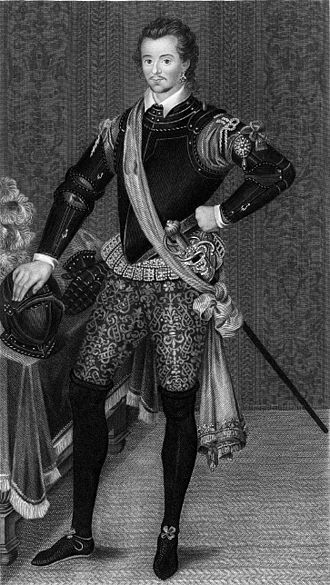Sir Robert Dudley and the Secrets of the Sea
by Julia Hickey
Chapter 1: An Adventurous Life

Robert Dudley was the ‘base born’ son of Queen Elizabeth I’s favourite, Robert Dudley, 1st Earl of Leicester. His mother, Lady Douglas Sheffield, the widow of John Sheffield 2nd Baron Sheffield, was the queen’s cousin and said to look very like King Henry VIII’s fifth wife, Katheryn Howard. Dudley, whose birth was kept secret from Elizabeth, was born on 7 August 1574 at Sheen House in Richmond. Leicester acknowledged his son and provided for the boy’s education. When he entered Oxford University in his fifteenth year it was as an earl’s son.
The circumstances of his birth have never been questioned but Dudley became convinced that his parents had undergone a clandestine marriage in the winter of 1573 rendering him the rightful claimant not only to his father’s titles but to those of his uncle, Ambrose Dudley, 3rd Earl of Warwick. If this was the case, Leicester’s subsequent marriage to Lettice Knollys, the widowed Countess of Essex, and Douglas’s own union with Sir Edward Stafford, the English Ambassador in Paris, were both bigamous. An undated letter from the earl to Dudley’s mother suggests that the relationship with Douglas began soon after her first husband’s death in 1568 and that Leicester was candid about the limitations of the relationship even if Douglas did press for more. The affair was secret from its start and without a full historical account it is impossible to draw any solid conclusions about whether or not Leicester did go through a form of marriage with Douglas Sheffield.
Dudley spent the first four years of his childhood in his mother’s care before being transferred into his father’s custody although he lived with various members of the extended Dudley family rather than in Leicester’s own household. At the age of seven he was sent to school at Offington near Worthing. The boy’s aptitude for mathematics became apparent early in his education so that when he entered Christ Church College in 1587 Leicester arranged for his son to be placed under the tuition of Thomas Chaloner the Younger, a gifted mathematician in his own right. Dudley’s interest in travel and science was also stimulated by his tutor who would remain the boy’s mentor and lifelong friend.
Dudley travelled from Oxford to join his father’s army at Tilbury in 1588 to resist the planned Spanish invasion. Leicester took the opportunity afforded by the occasion to commission his son as a Colonel of Foot under a more experienced officer’s supervision and to introduce him to Elizabeth I. The queen had taken an interest in Dudley since his father’s marriage to Lettice came to her attention in July 1579. It was an opportune encounter. Leicester died at his home in Wanstead on his way to Buxton to take the waters on 4 September 1588. In his will the earl, having no surviving recognisably legitimate child, described Robert as ‘his reputed bastard son’ and left him the bulk of his estates, including Kenilworth Castle, rather than allowing his fortunes to pass to his legitimate nephew, Sir Robert Sidney. When Ambrose Dudley wrote his own will in 1590, he similarly bequeathed much of his own land to Dudley rather than Sidney. The significance of these bequests was amplified by the fact that the queen ensured that none of Leicester’s debts to the Crown were extracted from Dudley’s share of the estates. Whilst the earl’s widow was not welcome at Elizabeth’s court, Douglas, freshly returned from Paris, took up service as a Gentlewoman of the Privy Chamber with permission for her son to visit her.
Dudley - handsome, wealthy and only seventeen-years old - made his mark at court supported by his extended family and the favour of the queen. He soon became smitten by Margaret Cavendish, a cousin of Thomas Cavendish, the second Englishman to circumnavigate the world. Dudley offered to back Cavendish’s next voyage to the South Seas having heard about the explorer’s exploits. His intentions towards Margaret were demonstrated when he broke protocol and kissed the girl in front of Queen Elizabeth. Dudley, in marrying Margaret soon after the episode, also gained a kinsman in Richard Hakluyt, the renowned travel writer and chief promoter of the colonisation of Virginia during the reign of James I. Despite Cavendish’s death at sea near Ascension Island in May 1592, Dudley was determined to follow in Drake and Cavendish’s wake with his own voyage to the South Seas. Writing at the end of his life, Dudley was proud to include three lord admirals amongst his ancestors. His father and uncle were amongst Sir Francis Drake’s, Martin Frobisher’s and John Hawkins’ backers. Little wonder that Dudley was obsessed with the sea.
He began by commissioning his own vessels from the queen’s master shipwright, Matthew Baker. However, Elizabeth I was not convinced that Leicester’s boy was old enough or sufficiently experienced to undertake the dangerous journey through the Straits of Magellan or round Cape Horn. Instead, in 1594, she permitted him to go on a voyage to the West Indies under the supervision of Captain Wyatt and the navigator Abraham Kendal. She issued Dudley with a Letter of Marque permitting him to take and plunder vessels belonging to Spain. Any profits from Dudley’s fleet of four vessels which included the Bear and the Bear’s Whelp would come from privateering. The voyage, for which Dudley wrote an account at the request of Hakluyt, included the capture of two Spanish vessels off Tenerife, exploration of the interior of Trinidad and an expedition using the Bear’s longboat in search of gold up the Orinoco. Dudley’s men were gone for sixteen days. By the time they returned they had rowed 250 miles and were almost starved. The crew’s venture took place before Sir Walter Raleigh’s more famous expedition in search of the golden city of El Dorado arrived in the area. The Bear made its return journey in storms and encountered a Spanish man-of-war before reaching home at the end of May 1595 only for Dudley to discover that his wife of a few short months was dead. The following year his experience at sea gained him command of the Nonpareil at Cadiz and a knighthood on his return to Plymouth but fortune was turning against Leicester’s son.

